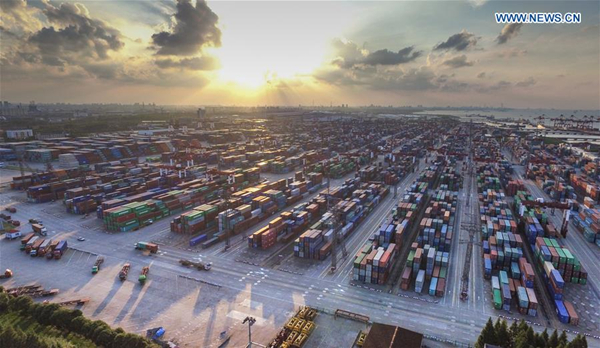Reflections on the 40th anniversary of China's opening-up decision
- By Elenoire Laudieri
 0 Comment(s)
0 Comment(s) Print
Print E-mail China.org.cn, October 2, 2018
E-mail China.org.cn, October 2, 2018

A lot has been written about the 40th anniversary of Chinese Communist Party's decision to introduce a market economy and allow private enterprise and foreign companies to do business and invest in China.
This momentous decision was announced on December 22, 1978, at the end of the third plenary meeting of the Central Committee of the Communist Party of China (CPC). The international community did not pay much attention to this even though it was a historic decision for both China and the whole world.
The People's Republic of China opened itself to the world gradually and steadily, embarking on prodigious industrial and urban development and lifting hundreds of millions of people out of poverty.
In just four decades, a nation with a population of more than 1.3 billion people achieved a level of industrialization and urbanization that many Western countries took two centuries to realize.
Many new cities sprouted especially along the east coast, and together with the major cities of Beijing, Shanghai, Tianjin and Chongqing, they became thriving industrial and trade centers that helped China to become a driving force in the economic development of many countries.
The statistics are well known. China has the world's second largest GDP (US$12.2 trillion) and its share of the world economy has grown from 1.8 percent in 1978 to over 18 percent in 2017. In addition, China boasts the world's largest foreign reserves (US$3.2 trillion) and the third-highest volume of foreign direct investments (US$170 billion).
Equally impressive has been the transformation of Chinese society. The success of the reforms and opening up has also substantially improved personal freedoms. More than 140 million Chinese now have passports to travel abroad and some 800 million communicate within and outside China through the internet. The information networks accessible to ordinary citizens have expanded beyond their wildest imagination and China is today at the forefront of the global frontiers of knowledge and technology.
Changes of such dimensions and at such a speed inevitably impinge on people's way of life and long-held beliefs and customs. Yet for all the initial disruptions brought about by the changes, and the many challenges they created, most Chinese welcomed the transformation and enjoy its many benefits today.
The marked improvement of people's living conditions has provided a strong base for continuity in political leadership and the government is firmly engaged in addressing the areas of social inequality, environmental deterioration and corruption.
The eradication of large pockets of poverty that still exist, particularly in the inner regions, is also a top government priority. Meanwhile, the decreasing availability of cost-effective labor brought about by the overall higher living standards is being tackled by the expansion of the tertiary industry.
Finally, the Belt & Road Initiative – a US$1.3 trillion Chinese-led investment program that seeks to create a comprehensive infrastructure network of roads, railways, telecommunications, energy pipelines, and ports – will enhance economic interconnectivity and facilitate development across Eurasia, East Africa and in more than 60 partner countries. This is a project of unprecedented magnitude, which reflects China's vision of the future and its determination to fulfill it.
Despite all these extraordinary achievements, many Western policy analysts dispute the validity of China's political system, claiming that it is undemocratic because it is based on a single party – the Communist Party of China. But China makes no pretense to be – or to want to be – a Western style democracy, nor does it seek to teach other countries how to govern themselves.
Nevertheless, its system can indeed be described as China's own form of democracy, which it developed from its own culture and political experience. Chinese citizens expect the CPC and its leaders to govern the country while having the peoples' wellbeing at heart and not to seek power for its own sake.
Quite emblematic in this respect, are the words pronounced by President Xi Jinping some years ago at the College of Europe in the Belgian city of Bruges: "Constitutional monarchy, imperial restoration, parliamentarism, a multi-party system and a presidential system, we considered them, tried them, but none worked."
Forty years after the start of the economic reform process, the "Chinese Dream" put forth by President Xi Jinping is well on track to be accomplished. It's a dream of national rejuvenation and about making China a "moderately prosperous society" by 2020, a "modern socialist country" by 2035 and a "powerful country" by 2050.
Today's Chinese see themselves more and more as heirs of a great civilization that was the world leader in culture, science, technology and administration right up to the 16th century. In this ideal conception, China – the "Middle Kingdom," as it is still called in Chinese today – aims to recover the grandeur of its past and lead its people and humanity into a new and long era of peace, co-operation and shared prosperity.
Elenoire Laudieri is a Sinologist, she is the Chief Analyst on Chinese Affairs at Nato College Foundation and a foreign affairs writer for international magazines and publications.
Opinion articles reflect the views of their authors, not necessarily those of China.org.cn.






Go to Forum >>0 Comment(s)